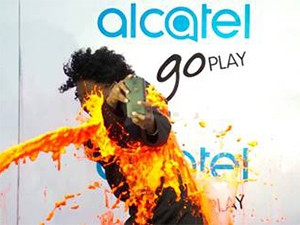
The newly re-branded Alcatel is focusing on SA's young adults, university students and millennials by offering affordable, mid-range "stand-out" smartphones.
The millennial target audience is a global strategy.
The company recently announced a logo redesign and name, saying it will now operate as Alcatel, not Alcatel OneTouch. This is in an effort to rejuvenate and streamline the over 20-year-old brand, as well as talk to its new audience.
Ernst Wittmann, Alcatel SA MD, says the firm needed to rebrand to stay relevant. "The people we are trying to talk to were not even born when we started."
Alcatel says it offers an array of handsets to suit each income bracket. However, Alcatel SA has opted not to bring its new flagship device, the Idol, into the country.
"This is because they would get lost in a sea of screens, with nothing to differentiate it from the likes of Huawei and Samsung," says Wittmann.
He feels the top-tier smartphone market is saturated in SA and the Alcatel Idol would not be able to compete.
Instead, the company recently launched the Alcatel Pop Star and Go Play in SA. These devices are customisable and offer the mid-range market affordable, alternative devices, it says.
The Pop Star retails for R2 299 and the Go Play for R3 499.
Other smartphones in the mid-range market in SA are the Xiaomi Mi 4 (R3 799), the LG G4 Beat (R4 899) and the Huawei P8 Lite (R3 299).
"We want to be the best alternative to other brands and to remain affordable," says Wittmann.
Colourful options
The Go Play is available in lime green, dark grey and dark red. Wittmann says the South African market is normally quite conservative when it comes to colourful devices, so it will be interesting to see how the lime green option does.
The device is also water-, dust- and shock-resistant. Wittmann says this is perfect for millennials as they can take their smartphones with them where ever they go.
Alcatel did a tour of South African universities recently to let students test this feature. Paints, coloured powder, glitter and other props were thrown at the students, holding the smartphone, to capture the "ultimate selfie".
The Pop Star is more fashion-focused, with two changeable covers (denim and light bamboo) that come standard.
Both devices are 3G. "Retailers have told us they prefer 3G and say 4G is useless for the mid-range market, especially in the Western Cape because it is so hard to pick up that signal," notes Wittmann.
The smartphones operate on Android Lollipop, rather than the latest version of the Android operating system. Wittmann says this is because the company wanted to keep the prices low and Lollipop had sufficient capabilities.
Globally, Alcatel is the fifth largest handset manufacturer with a 4.5% market share. In SA, the company is number four with an 11% market share. Wittmann says this is largely due to its partnerships with companies like Vodafone, which use the Alcatel product with their own branding.
He says in the US, the company has been operational for three years and is already third largest in terms of market share.
Share